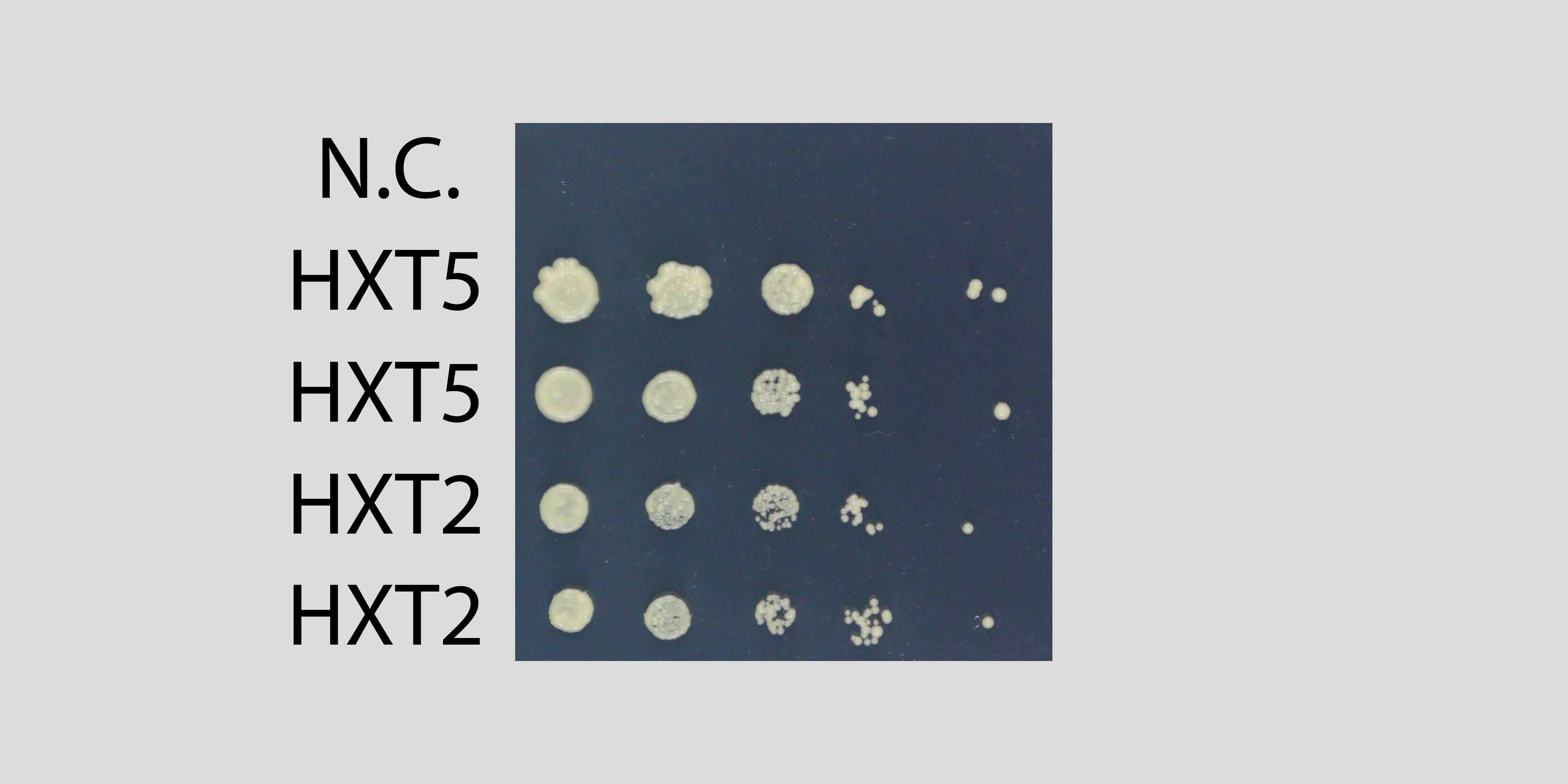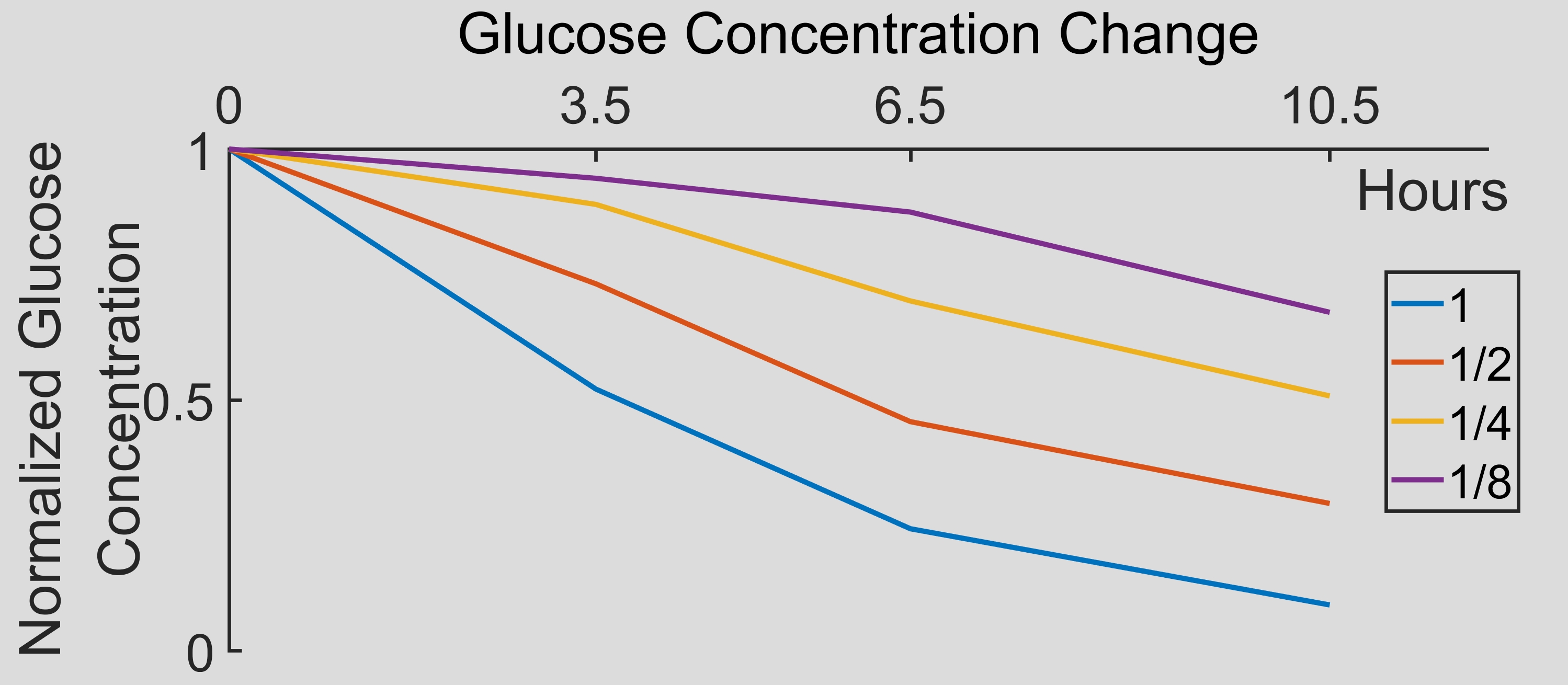Difference between revisions of "Part:BBa K2247002"
| Line 14: | Line 14: | ||
| − | [[File:Constitutive HXT on glucose medium.jpeg| | + | [[File:Constitutive HXT on glucose medium.jpeg|400px]] |
| Line 20: | Line 20: | ||
This strain of yeast (JDYY001) is knockout of all Hexose Transporter (HXT)-related genes, and therefore cannot use glucose as a carbon source. The yeast cells were transformed with plasmids constitutively expressing HXT2, or HXT5, or empty vector as a negative control, and plated onto the medium where glucose is the only carbon source. Serial dilution clearly showed the growth of yeasts. Therefore, HXT2 or HXT5 expression can effectively allow JDYY001 grow on glucose-only medium. | This strain of yeast (JDYY001) is knockout of all Hexose Transporter (HXT)-related genes, and therefore cannot use glucose as a carbon source. The yeast cells were transformed with plasmids constitutively expressing HXT2, or HXT5, or empty vector as a negative control, and plated onto the medium where glucose is the only carbon source. Serial dilution clearly showed the growth of yeasts. Therefore, HXT2 or HXT5 expression can effectively allow JDYY001 grow on glucose-only medium. | ||
| + | |||
| + | |||
| + | [[File:Constitutive HXT glucose concentration curve.jpeg|500px]] | ||
| + | |||
| + | |||
| + | =====Figure 2. The decrease of glucose concentration in media containing HXT2-expressing yeast cells.===== | ||
| + | |||
| + | JDYY001 (HXT-related genes knockout) yeasts were transformed with plasmids constitutively expressing HXT2, and cultured in media with identical starting concentration of glucose, which was the only carbon source. Different groups had different amounts of yeast cells at the starting point (denoted as dilution folds, 1, 1/2, 1/4 and 1/8). Glucose concentrations in the media were measured at 0 h, 3.5 h, 6.5 h, and 10.5 h with a standard glucometer, and normalized to the starting concentration. The figure showed that glucose in the media indeed decreased over time. | ||
Revision as of 17:26, 31 October 2017
HXT2 glucose transpoter from S. cerevisiae
High-affinity glucose transporter 2 (HXT2) is a member of the HXT transmembrane glucose transporter family of S. cerevisiae. HXT2 is localized to the plasma membrane, and has glucose, fructose, mannose and pentose transmembrane transporter activity.
Usage and Biology
HXT2 is a high-affinity glucose transporter in S. cerevisiae. We expressed HXT2 in HXT-related genes knockout yeast (Strain JDYY001, modified from Strain EBY.VW4000 that is kindly provided by Dr. Junbiao Dai's Group from Tsinghua University), so that the decrease of glucose level in media can report the level of gene expression induced by aflatoxin, which we aimed to detect. In this way, we innovatively used glucometer as a method of readout, which can facilitate the household use of our system.
Characterization
Figure 1. The growth of HXT-expressing yeast cells on glucose-only medium.
This strain of yeast (JDYY001) is knockout of all Hexose Transporter (HXT)-related genes, and therefore cannot use glucose as a carbon source. The yeast cells were transformed with plasmids constitutively expressing HXT2, or HXT5, or empty vector as a negative control, and plated onto the medium where glucose is the only carbon source. Serial dilution clearly showed the growth of yeasts. Therefore, HXT2 or HXT5 expression can effectively allow JDYY001 grow on glucose-only medium.
Figure 2. The decrease of glucose concentration in media containing HXT2-expressing yeast cells.
JDYY001 (HXT-related genes knockout) yeasts were transformed with plasmids constitutively expressing HXT2, and cultured in media with identical starting concentration of glucose, which was the only carbon source. Different groups had different amounts of yeast cells at the starting point (denoted as dilution folds, 1, 1/2, 1/4 and 1/8). Glucose concentrations in the media were measured at 0 h, 3.5 h, 6.5 h, and 10.5 h with a standard glucometer, and normalized to the starting concentration. The figure showed that glucose in the media indeed decreased over time.
Sequence and Features
- 10COMPATIBLE WITH RFC[10]
- 12COMPATIBLE WITH RFC[12]
- 21COMPATIBLE WITH RFC[21]
- 23COMPATIBLE WITH RFC[23]
- 25COMPATIBLE WITH RFC[25]
- 1000COMPATIBLE WITH RFC[1000]


